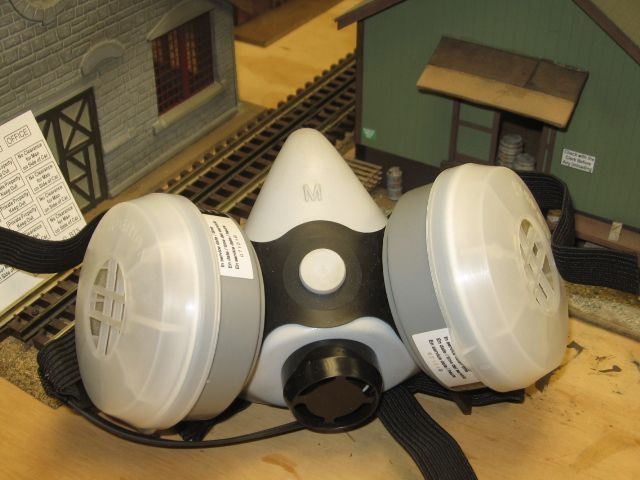Keep in mind the chemical is not good for breathing in your lungs read MSDS data Sheet below always use OUTSIDE UP WIND SO YOU DON'T INHALE IT !
Alan Mancus
|




|
Keep in mind the chemical is not good for breathing in your lungs read MSDS data Sheet below always use OUTSIDE UP WIND SO YOU DON'T INHALE IT !
Alan Mancus
@Alan Mancus posted:Keep in mind the chemical is not good for breathing in your lungs read MSDS data Sheet below always use OUTSIDE UP WIND SO YOU DON'T INHALE IT
Most of the stuff on the list of recommended track cleaners fits that category Alan, that's not exactly news. Besides, exactly how are you going to carry the layout outside to clean the track? I don't know about yours, but mine is just a bit too large for me to haul outside!
As with model paints, and related materials. An organic respirator.

Compared to the expense on a layout so far, the cost of the respirator, pictured, is peanuts. IMO. Cartridge(s) are replace-able.
I've never had an issue with the CRC cleaner. It even fixed my fussy thumbwheel on my dcs remote! Just don't spray at sparks! Lol
I have used 91% alcohol for track cleaning many years. Recently research has convinced me the mineral spirits is better and recently it was used. But now the track cleaning solvent is immaterial as I do not have to clean my track ever again.
I used NO OX ID A special as a track treatment in January 2022. Train operation on my conventional control, 027 layout with 31 Marx switches is much better and trains can be operated much slower. The track and improved operation has been better for 11 months so far and only time will tell if track cleaning has been eliminated forever.
Charlie
@Choo Choo Charlie posted:I have used 91% alcohol for track cleaning many years. Recently research has convinced me the mineral spirits is better and recently it was used. But now the track cleaning solvent is immaterial as I do not have to clean my track ever again.
I used NO OX ID A special as a track treatment in January 2022. Train operation on my conventional control, 027 layout with 31 Marx switches is much better and trains can be operated much slower. The track and improved operation has been better for 11 months so far and only time will tell if track cleaning has been eliminated forever.
Charlie
But, if you have traction tires on your engines will NO OXID damage them?
Almost any of the cleaners we are talking about have organic compounds in them that are in some way, shape and form toxic. It is why they say use them in well ventilated spaces and yes they are flammable. Compounds like benzene, carbon tet (used in clearning and firefighting systems), toluene, all are carcinogenic if exposed to it for long periods of time. I remember first day of organic chem lab, the TA running it listing the most common reagents we would be using and then saying every one of them was on the list of top cancer causing ingredients....
One thing to be careful of, don't use tuner cleaner (I had someone after I told them not to use it, use it; tuner cleaner has a lubricant in it. it is conductive, but also will attract dirt).
When using any kind of cleaner I recommend wearing disposable gloves (advice of course I don't always take myself), and when using it put a small amount on a lint free rag, wipe, then put more on the rag. It means the chemical goes where you need it only and it helps a bit with the fumes.
Someone suggested to be electronic wipes (like you use to clean monitors and displays and the like), I don't recommend them, most of them are alcohol based (some of the ways they describe alcohol on the ingredients cracks me up, and people tell me "it doesn't have alcohol"..it does.
Feet
I have some engines with traction tires. I did not use these locos to spread the NO OX during installation and they run fine after the NO OX was wiped off. They do not slip as the NO OX is gently wiped off after 24 hours after treatment. There are at least two sides on NO OX and a search on OGR will give both sides. NO OX is the only treatment that has shown to eliminate track cleaning. For me it has been only positive to date.
Charlie
@Choo Choo Charlie posted:Feet
I have some engines with traction tires. I did not use these locos to spread the NO OX during installation and they run fine after the NO OX was wiped off. They do not slip as the NO OX is gently wiped off after 24 hours after treatment. There are at least two sides on NO OX and a search on OGR will give both sides. NO OX is the only treatment that has shown to eliminate track cleaning. For me it has been only positive to date.
Charlie
Thanks Charlie!
Access to this requires an OGR Forum Supporting Membership
